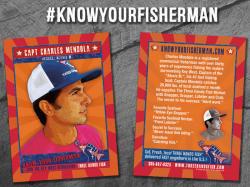City Of Key West Proclaims March 2018 As “Who Caught It?” Month
March 14, 2018 | 6 min to read

KEY WEST, FLORIDA – The City of Key West, in conjunction with the commercial fishermen of the Florida Keys and the Three Hands Fish sustainable seafood program, today announced that March 2018 will be known as Who Caught It? month.
The program is designed to help prevent the kind of seafood fraud that has plagued many American ports and cities from becoming an issue in the local community.
With this proclamation, the fishermen-sponsors will implement island-wide an innovative in-restaurant awareness campaign by the same name that promotes transparency by establishing the expectation that if restaurants and markets are claiming their seafood “fresh” and “local,” they should be able to answer the simple question, Who Caught It?.
This campaign was originally launched and beta tested in the second half of 2017. It is now ready for community-wide implementation in March 2018, according to Three Hands Fish co-founder, Paul Menta.
“As the backbone of our island economy, our Florida Keys commercial fishermen deserve to be recognized by the community for their contributions toward establishing Key West as the fresh seafood capital of the world,” stated Menta. “In an industry that is often plagued by anonymity and deception, this campaign will ensure such recognition by personalizing the seafood buying process through a simple, easy-to-ask and easy-to-answer question – Who Caught It?”
Participating restaurants and markets will not only answer the Who Caught It? question, they will hand out to each customer a Florida Keys Commercial Fisherman “baseball-style” card that profiles the fisherman who caught their meal.
“‘Who Caught It?’ isn’t about politicized and often abstract statistics or preachy sermons,” continued Menta. “It’s about one simple question, honest answers and making sure that Key West stays fresh.”
With these fishermen cards, not only will customers know that, say, Captain Charles Mendola caught their meal, they’ll also know how long he’s been fishing (30 years), the name of his vessel (Alexis M.), his favorite fish (yellow eye snapper), and much more. The campaign ensures that all local Key West seafood is tagged with both the name and face of the Florida Keys fisherman that reeled it, speared it, or trapped it.
“The antidote to seafood dishonesty is transparency – and that’s exactly what Who Caught It? provides,” said Captain Zane Osborn, a Florida Keys Commercial Fisherman and regular supplier of his locally-caught seafood to the Three Hands Fish market in Key West. “Through one simple question, tourists and locals alike can cut through marketing-speak to get to the what really matters: who caught the fish they are about to eat. So while seafood fraud may be an issue in coastal communities across the country, Who Caught It? is our defiant stand against it.”
A 2015 NOAA report concluded that 86% of the seafood consumed in the United States is imported, 50% of it coming from unregulated, unhygienic fish farms. 100% of it arrives frozen. 98% of all imported seafood is not inspected by the FDA.[1] According to recent exposés published by the Boston Globe[2], New York Times[3], Tampa Bay Times[4], and Consumer Reports[5], it is this seafood that is appearing on the menus of restaurants and markets across the country under the guise of fresh, local, and American catch.
“This is just the first of many steps Key West will take to ensure that our island remains a world capital of fresh and sustainable seafood,” concluded Key West Mayor Craig Cates. “Key West has always been a progressive island, standing brave in the face of adversity. This proclamation presents us with another opportunity to show the world just how progressive and forward-thinking we are.”
Key West citizens and tourists can promote seafood honesty and transparency throughout March and beyond by asking restaurants and markets advertising “fresh” and “local” seafood “Who Caught It?” to receive your fisherman card.
For more information on the Who Caught It? campaign and Three Hands Fish – the sustainable seafood program that directly connects Florida Keys commercial fishermen and their day’s catch with local restaurants and community members – visit www.knowyourfisherman.com.
[1] National Oceanic and Atmospheric Association (NOAA, 2015): "The U.S. imports up to 90 percent of its seafood, about half of which is aquaculture."
Source: The City of Key West
